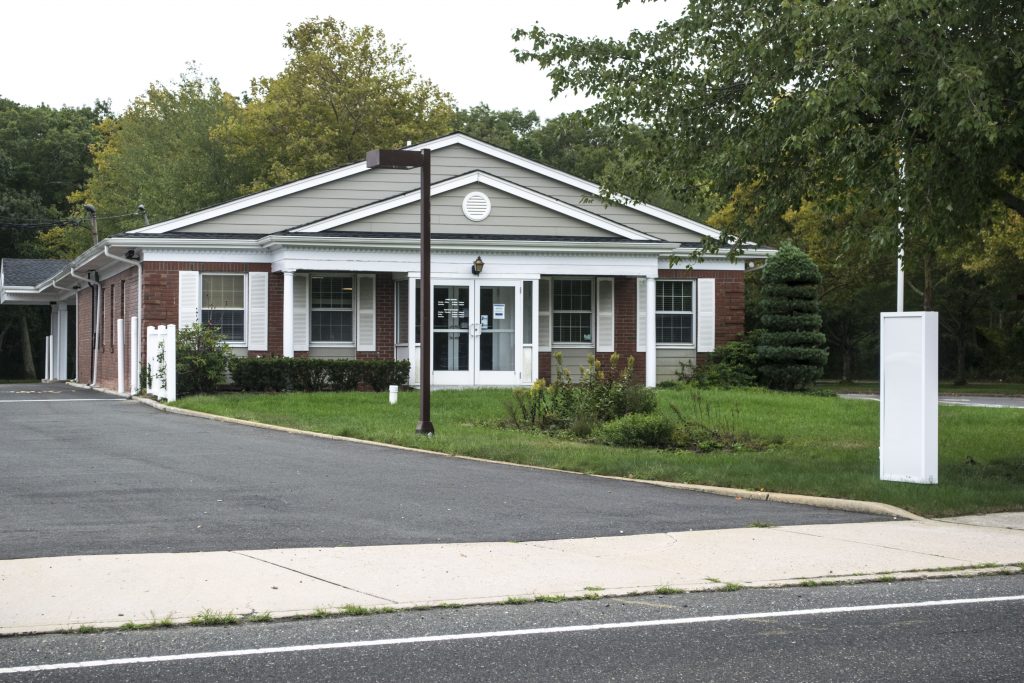
The location where a medical marijuana facility will be proposed in Brick Township. (Photo: Daniel Nee)
Is a medical marijuana grow house a farm?
That question will be at the heart of a hearing scheduled for May 30 to determine whether a smooth or rocky path awaits Jersey Shore Therapeutic Health Care (JSTHC) as the fledgling medical cannabis provider attempts to gain permission to build a 48,000 square foot grow cultivation center in the township’s Rural Residential (RR1) zone. Earlier this year, JSTHC abandoned plans to incorporate a cannabis dispensary at their proposed site, 385 Adamston Road, a former OceanFirst Bank branch.
It may not seem like a pressing issue – which board, zoning or planning, will be tasked with granting or denying the company’s application – but it may well represent the most crucial legal question JSTHC will face. If the application’s venue is switched to the planning board from the zoning board, the move makes it easier for the facility to be approved since a supermajority vote will no longer be required and the narrow criteria under which a use variance can be issued no longer applies. Farms are a permitted use in the RR1 zone, however it is likely that neighbors who have hired attorneys to object to the application will argue that a medical cannabis cultivation facility does not conform to Brick’s zoning ordinance.
|
|
According to the township code, the RR1 zone permits “customary and conventional farming operations.” Additionally, it permits “customary farm buildings for the storage of products or equipment or for the processing of farm products and which are located on the same parcel as the principal use.”
The board will be tasked with determining whether JSTHC’s proposed use of the property is, indeed, a farming operation. If they determine it is, the planning board will take jurisdiction of the case and the applicant will no longer need to obtain a use variance for the project. If the board determines the application does not fit the ordinance’s definition of a farm, the case would remain pending before the zoning board (formally known as the Board of Adjustment) and would require supermajority approval of the use variance, which is governed by a slew of criteria under the state’s Municipal Land Use Law.
“Our position is that we are a farm, and farming is a permitted use, so there’s going to be an interpretation,” said Anne Davis, co-owner of JSTHC. “It is a matter of law only for them to decide, ‘are we a farm or are we not a farm?’ If we are a farm, we proceed. If we’re not a farm, we go before a judge to challenge that determination.”
Davis, an attorney by trade, stressed that the determination hearing is not like previous hearings on the company’s application where substantive matters were discussed.
“This is not a matter of public opinion, it’s a matter of law,” she said.
Indeed, the hearing will focus only on the jurisdictional aspects of the case rather than the question of whether the application should be approved.
The bitter battle between JSTHC’s owners and neighboring residents, however, is expected to spill over into the hearing regardless of the nature of the proceedings. A Facebook page that represents opposition to the project is rallying members of the public to attend the meeting, which will be held at 7 p.m. at Civic Plaza.
“We need all to come out and support our neighborhood,” a post on the page said. “We haven’t gone away! Time to round the troops!”
Davis told Shorebeat she would not be attending the meeting since it is dealing only with procedural matters.
“The objectors are hyping it up to be a continued hearing on a marijuana dispensary, and that’s just not true,” she said.

Advertisement

Police, Fire & Courts
Grand Jury Indicts Point Pleasant Man, Once a Fugitive, for Attempted Murder








